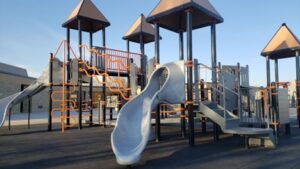Playgrounds are a place for children to explore, have fun, and connect with the community. Yet, more than 200,000 children a year suffer from injuries associated with playground equipment that require emergency visits. With spring around the corner, here are some tips on how to avoid playground injuries and what to do if your child is injured on the playground.
What Are Common Playground Injuries?
One of the risks associated with playgrounds is concussions. According to the Center for Disease Control and Prevention (CDC), children are more likely to get a concussion or suffer another serious brain injury from using the monkey bars, climbing equipment, and swings. Other common injuries include broken bones, dislocations, sprains and strains, and internal organ injuries. While rare, some playground injuries have also resulted in death. 
What are Some Playground Safety Tips to Avoid Injury?
- Only use playground equipment suitable for your child’s age. Playground equipment is specifically designed for these 3 different age groups: 6-23 months; 2-5 years; and 5-12 years.
- Make sure there is always an adult to supervise.
- Check that the playground has soft material under it. Examples include wood chips, mulch, or sand. The Consumer Product Safety Commission (CPSC) recommends this protective surface be at least 12 inches deep and extend at least 6 feet in all directions. Mats made of rubber-like material can also help to absorb and soften falls.
- Look to see if there are guardrails or barriers on the playground equipment to help prevent falls. Unprotected elevated areas 30 inches or higher should have guardrails or barriers present.
- Avoid strangulation hazards such as sweatshirts with drawstrings, necklaces, and bike helmets. Also avoid attaching things like jump ropes or pet leases to playground equipment.
- Be aware of the weather. On sunny days, metal equipment such as slides and swings can become very hot to touch. On the other hand, on rainy days, equipment can become quite slippery and increase the risk of falls.
- Watch out for things that your child could trip on, such as rocks, concrete, or tree stumps.
- Check for sharp edges. Particularly on wooden structures, check for any nails or screws that stick out. On metal structures, watch for rust or peeling paint that could contain lead in it.
- Make sure children are going feet first down the slide.
- Check for overcrowding. There should be a minimum of 6 feet around playground equipment on all sides.
Who is liable if my child is injured on a playground?
If your child is injured at a public park or school, the local town, city, or county where the injury occurred may be responsible if the injury was the result of negligence, for example in failing to properly maintain the playground equipment. A contractor or manufacturer may also be liable if there was negligent installation, design, or maintenance of playground equipment. However, in Massachusetts, unlike many other states, whether a playground is publicly or privately owned makes a difference in what can be recovered for playground injuries. Massachusetts has what is called the Massachusetts Tort Claims Act, which states that public employers, like schools and towns, are liable for injuries caused by the negligent acts of their employees. But the Act places a cap of $100,000 for any recovery against the public employer. If a school is privately owned, then the cap on damages under the Massachusetts Torts Claim Act does not apply. But if a playground is owned by a charity, such as a church or a school organized as a charity, the charity’s liability may also be capped under Massachusetts law, while claims against a charity’s employees would not be capped.
Finally, if an injury is caused by a third party, such as another adult or child on the playground, then the playground owner will generally not be liable, but there may be a viable claim against the at-fault party, whose homeowner’s insurance may cover the claim. In short, as long as negligence can be established, the law allows for recovery for injuries that occur on playgrounds, but the analysis is not always straightforward in light of some peculiar Massachusetts laws.
If your child has been injured, and you wish to speak with one of our attorneys regarding liability, please fill out a Contact Form, call us at 617 542-1000 or e-mail . SUGARMAN has a team of dedicated personal injury lawyers with decades of experience with negligence and products liability claims.
